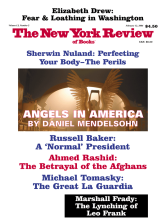To the Editors:
There is an amusing but basic error on page 37 of your October 9, 2003, issue [“The Whole World in Their Hands”]. In his review of the McNeills’ world history, Jonathan Spence quotes Sir Walter Ralegh’s famous observation: “Whosoever in writing a modern history shall follow truth too near at the heels…,” etc. But Ralegh’s actual word in the following clause is “haply,” not “happily”—meaning, of course, “by chance or fortune,” not felicitously. I imagine this must have been a proofreader’s emendation of an “obvious” typo, one of the occupational hazards every writer faces from time to time.
Edwin M. Yoder Jr.
Alexandria, Virginia
Jonathan Spence replies:
Naturally I also thought it must be a misprint, when I saw “happily” in the C.A. Patrides edition of Ralegh’s History (on page 80). But Patrides does not make mistakes, especially not when writing about Ralegh. So I checked the Yale copy of the 1614 History (as reissued in 1617) and there, sure enough, is the word “happily” (Ralegh’s unpaginated preface, penultimate page). That Ralegh wrote “happily” when he was thinking “haply” is explained in the grand second edition of the OED, which tells us that “haply” was often written “happely” in the early seventeenth century. That is how Shakespeare wrote it in Othello (as uttered by Desdemona) and “happely” was still being used for “haply” as late as 1650. So it was Ralegh, not some “proofreader,” who spelled it “happily,” and let the spelling stand in the reprinting. Then he died.
This Issue
February 12, 2004



